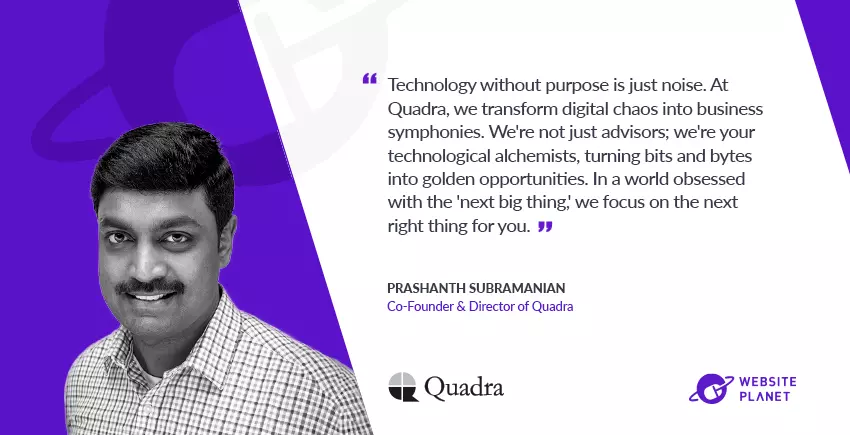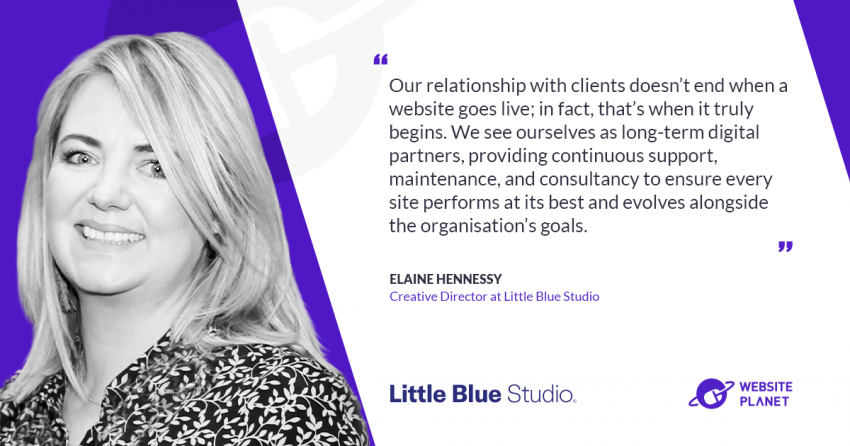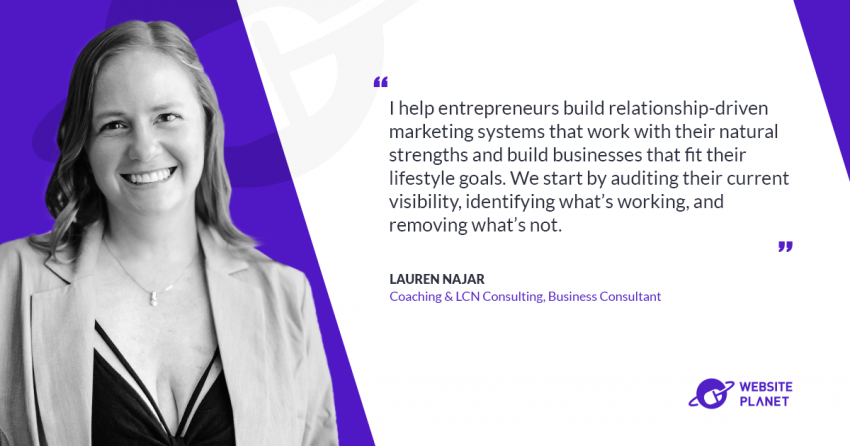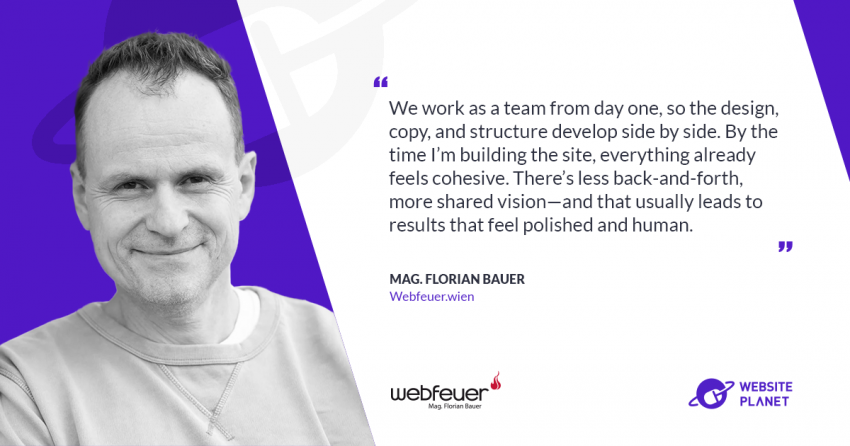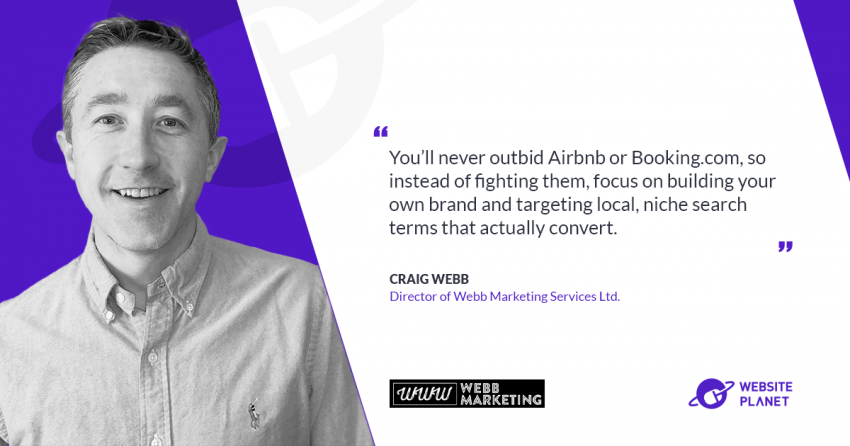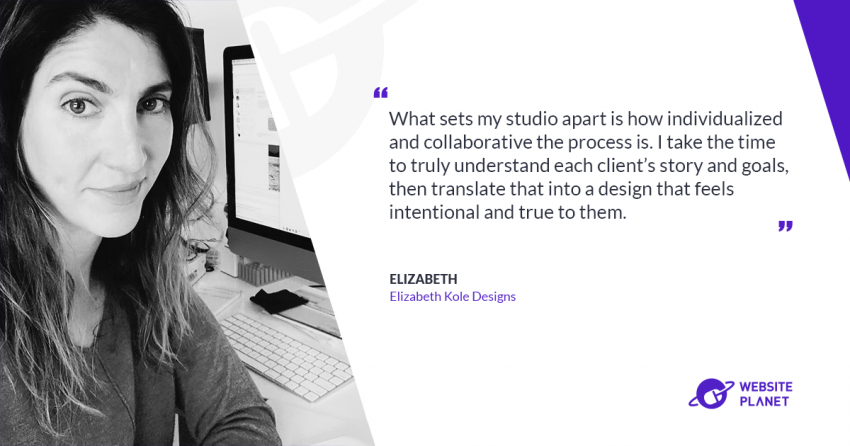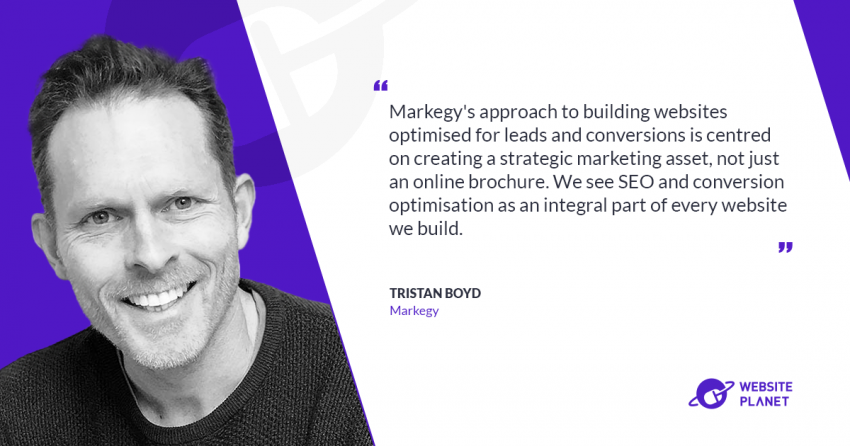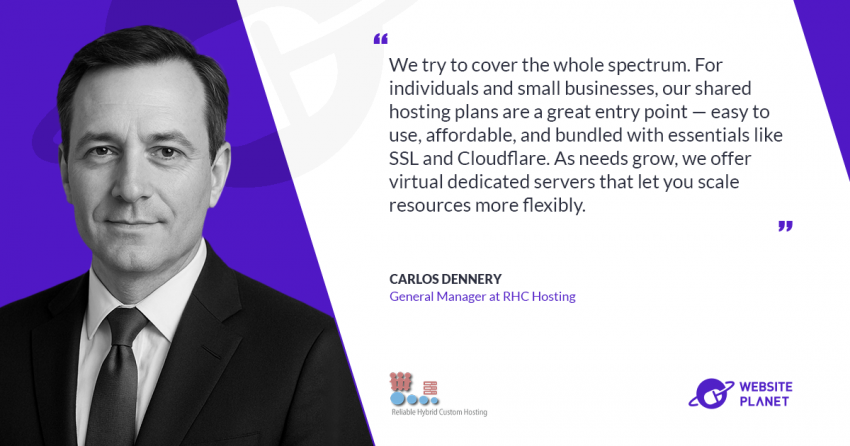What does it take to build a business that not only survives but thrives in today’s competitive marketplace? In this interview series by Website Planet, executives from successful technology companies reveal how they identified and solved the most urgent problems in their fields, the secrets that help them stand out even in the most competitive markets, and how they’re positioning themselves for the future.
Prashanth Subramanian is the Co-Founder and Director of Quadrasystems.net India Pvt Ltd, a prominent Microsoft partner with 3000+ customers and over 20 years of experience in leveraging technology for business transformation. He co-founded the company in December 1999 and has been instrumental in its development, earning multiple awards from Microsoft for excellence in execution and growth. Prior to that, he covered leadership roles at TIDEL Park Coimbatore Limited, IAMCP International, and the Confederation of Indian Industry (CII)
Why is now the time for your company to exist? What are the most pressing pain points you solve, and what makes them more urgent now than ever?
Now is the perfect time for Quadra to exist as businesses face unprecedented challenges and opportunities in the digital landscape. We solve three critical pain points that have become increasingly urgent in today’s rapidly evolving technological environment:
1. Strategic AI Integration
The explosive growth of AI has created both immense potential and complexity for businesses. In less than three years since AI entered the mainstream consciousness, it has generated trillions of dollars in value and demonstrated its transformative power across every industry and function. Quadra serves as a trusted advisor, helping organizations navigate this complex landscape and leverage AI for strategic advantage.
2. Digital Infrastructure Modernization
As technology becomes increasingly integral to business success, the need for modern, agile digital infrastructure has never been more critical. We guide companies through the intricate process of cloud migration and infrastructure modernization, ensuring they have the technological foundation to compete effectively in today’s fast-paced markets.
3. Comprehensive Cybersecurity
With the rapid digitalization of business processes and assets, cybersecurity has become a top priority. Quadra helps organizations implement robust security measures that protect their digital assets without constraining innovation or growth.
The pace of technological change has accelerated exponentially, with digital tools now enabling new business models, revenue streams, and access to previously untapped markets. This has significantly increased the complexity of decision-making for organizations across multiple dimensions. As a result, the need for a trusted technology advisor like Quadra is more pronounced than ever before.
We act as a technological GPS for our clients, helping them navigate the unfamiliar terrain of emerging technologies and choose the optimal path to their business destinations. By addressing these urgent pain points, Quadra plays a crucial role in helping businesses not just survive, but thrive and grow faster in today’s competitive digital landscape.
What unique features and capabilities help you solve them in a better way than other solutions? Can you share metrics and examples that show the difference you’re making?
At Quadra, we pride ourselves on our unique approach to solving our clients’ technology challenges. Our distinctive features and capabilities set us apart in the following ways:
Customer-Centric Approach
Our organization’s DNA is built on a customer-centric philosophy. We don’t just provide technology solutions; we act as a bridge between technology and business outcomes. This approach allows us to:
- Put customer interests first, above all else
- Serve as trusted advisors, not just technology partners
- Connect technology directly to business outcomes
Deep Expertise and Experience
Quadra’s team possesses more than 750+ professional IT certifications, providing us with the depth of knowledge required to tackle complex technological challenges. Our experience spans multiple industries and technology solutions, giving us unique insights that benefit our clients.
Vendor-Agnostic Solutions
We focus on delivering vendor-agnostic and technology-neutral solutions that prioritize customer interests. This approach ensures that we recommend and implement the best possible solutions for each client’s specific needs, rather than pushing particular products or technologies.
Comprehensive Service Offerings
Our services cover the entire spectrum of IT infrastructure needs:
- Strategic AI integration
- Digital infrastructure modernization
- Comprehensive cybersecurity
- Cloud migration and management
- Application delivery and development
- Managed services
Metrics and Examples
While we don’t publicly disclose specific client metrics, we can share some examples that demonstrate the impact of our solutions:
- For a leading fleet management provider, we implemented a DevOps transformation journey that significantly improved their operational efficiency and software delivery speed.
- We helped a global fintech SaaS company accelerate their digital transformation, enabling them to scale their operations and improve their market competitiveness.
- For a global pharma leader, we transformed the employee experience for over 20,000 users, enhancing productivity and collaboration across the organization.
- We secured mission-critical data for 10,000+ users at India’s leading lifestyle brand, significantly improving their cybersecurity posture.
- By moving SAP to the public cloud for a metal manufacturer, we boosted performance, enhanced security, and reduced costs simultaneously.
These examples showcase our ability to deliver tangible business outcomes across various industries and technological domains. Our success is measured by our clients’ success, and we take great pride in the positive impact we’ve had on businesses ranging from startups to global industry leaders.
What are your numbers right now in terms of revenue, customers, and team?
We are a 300+ person company, doing healthy double digit million dollar revenues, and operating in key cities across India. We have made a difference to over 3,000 customers through our consulting and services.
What are the biggest challenges your company has overcome since its founding? If you had to start over, what would you do differently?
Since Quadra’s founding, we’ve overcome several significant challenges that have shaped our growth and success:
Rapid Technological Evolution
One of the biggest challenges we’ve faced is keeping pace with the rapidly evolving technological landscape. As a technology advisor, we’ve had to continuously update our expertise and service offerings to remain relevant and valuable to our clients. We’ve addressed this by:
- Investing heavily in ongoing training and certification for our team
- Cultivating a culture of continuous learning and innovation
- Maintaining strong partnerships with leading technology providers
Building Trust in a Competitive Market
Establishing ourselves as a trusted advisor in a crowded and competitive market was another significant hurdle. We overcame this by:
- Consistently delivering high-quality, customer-centric solutions
- Focusing on building long-term relationships rather than short-term gains
- Demonstrating our value through tangible business outcomes for our clients
Scaling Operations While Maintaining Quality
As we grew, maintaining our high standards of service delivery across a larger client base and more diverse range of projects presented challenges. We addressed this by:
- Implementing robust quality control processes
- Developing a strong leadership pipeline
- Investing in technology and tools to streamline our operations
If We Had to Start Over
While we’re proud of our journey, there are always areas for improvement. If we were to start over, we might:
- Accelerate Our Cloud Adoption Focus: Given the central role of cloud technologies today, we would likely have pivoted to cloud services even earlier in our journey.
- Emphasize Data Analytics Earlier: Recognizing the growing importance of data-driven decision making, we would integrate data analytics capabilities into our service offerings sooner.
- Expand Global Presence Faster: While we’ve successfully served clients across industries, expanding our global footprint earlier could have accelerated our growth and diversified our experience.
- Invest More in Proprietary IP: While we’ve developed custom solutions for clients, a greater focus on creating proprietary intellectual property could have further differentiated our offerings.
Despite these potential adjustments, our core philosophy of putting customer interests first and connecting technology to business outcomes would remain unchanged. This approach has been fundamental to our success and has allowed us to build lasting relationships with our clients, helping them navigate technological change and complexity effectively.
What is the most powerful and easy-to-apply tactic that helped you quickly increase revenue and traffic? What metrics did it move and by how much?
We’re increasing our focus on digital selling, and today, actively get close to 50+ qualified sales leads every week through a combination of various digital marketing activities, including AI and automated tools.
What emerging trends and technologies will impact your industry the most in the next few years, and how do you suggest getting ready for these changes?
Based on the latest technology trends and their potential impact across industries, I would highlight the following key areas that are likely to significantly affect most businesses in the coming years:
Artificial Intelligence and Machine Learning
AI and ML are rapidly evolving and becoming more sophisticated, with generative AI emerging as a transformative force. To prepare:
- Invest in AI/ML training for employees across different functions
- Identify high-impact use cases for AI in your specific industry
- Partner with AI experts to develop customized solutions
- Establish ethical guidelines for responsible AI adoption
Cloud and Edge Computing
The shift towards hybrid cloud models and edge computing is accelerating. To get ready:
- Develop a comprehensive cloud strategy aligned with business goals
- Invest in edge computing infrastructure for latency-sensitive applications
- Upskill IT teams on cloud and edge technologies
- Implement robust cloud security and governance frameworks
Cybersecurity
As cyber threats grow more sophisticated, cybersecurity remains a top priority. Preparation steps include:
- Conduct regular security audits and penetration testing
- Implement advanced security protocols and AI-driven threat detection
- Provide ongoing cybersecurity training for all employees
- Develop incident response plans for potential breaches
5G and Advanced Connectivity
The rollout of 5G networks will enable new applications and business models. To leverage this:
- Identify use cases that can benefit from high-speed, low-latency connectivity
- Upgrade network infrastructure to support 5G capabilities
- Explore partnerships with telecom providers for 5G-enabled solutions
- Develop strategies for data management and analytics at scale
Sustainability and Green Technology
With increasing focus on environmental impact, sustainable tech is gaining importance. Prepare by:
- Assessing your organization’s carbon footprint and setting reduction targets
- Investing in energy-efficient technologies and renewable energy sources
- Exploring circular economy principles in product design and manufacturing
- Developing sustainability metrics and reporting frameworks
How to effectively prepare for these changes:
- Establish a dedicated innovation team to monitor emerging trends and technologies
- Allocate budget for experimentation and pilot projects in key technology areas
- Foster a culture of continuous learning and adaptability across the organization
- Collaborate with startups, academia, and industry partners to stay at the forefront of innovation
- Regularly reassess and update your technology strategy to align with evolving business needs and market dynamics
By proactively addressing these trends, businesses can position themselves to thrive in an increasingly digital and technology-driven future.
If there was one unconventional piece of advice you wish our readers could bring home from this interview, what would it be?
Embrace the art of productive failure.
Fear of failure often holds organizations back from true innovation and growth. However, some of the most significant breakthroughs in history have come from what initially appeared to be failures.
Here’s how to put this advice into practice:
Cultivate a “Failure-Positive” Culture
Encourage your team to view failures not as setbacks, but as valuable learning opportunities. Create an environment where calculated risks are rewarded, regardless of the outcome.
Implement “Failure Fridays”
Dedicate time each week or month for team members to share their failures openly. This practice normalizes failure, promotes transparency, and allows the entire organization to learn from individual experiences.
Celebrate “Productive Failures”
Recognize and reward team members who take intelligent risks, even when they don’t pan out as expected. This reinforces the idea that the attempt itself is valuable.
Practice Rapid Prototyping
Embrace a “fail fast, learn faster” approach by quickly developing and testing ideas. This allows you to identify and address issues early, saving time and resources in the long run.
Conduct “Failure Post-Mortems”
After a project doesn’t meet expectations, conduct thorough analyses to extract valuable insights. Focus on what can be learned rather than assigning blame.
Reframe “Failure” as “Experiment”
By viewing initiatives as experiments rather than pass/fail endeavors, you shift the focus to learning and iteration rather than binary outcomes.
This approach may seem counterintuitive, especially in high-stakes business environments. However, by embracing productive failure, organizations can foster a culture of innovation, resilience, and continuous improvement. This mindset is crucial in navigating the complex and rapidly evolving technological landscape.
“I have not failed. I’ve just found 10,000 ways that won’t work.” Each “failure” brings you one step closer to success”
Thomas Edison
How can our readers connect with you?
LinkedIn: https://linkedin.com/in/quadra
X: https://x.com/s_prashanth
